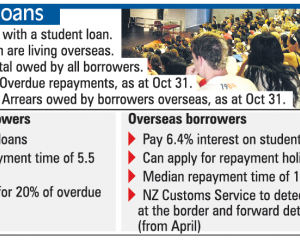
Australian-based borrowers in particular will be targeted, as the Inland Revenue Department increasingly uses legal action or debt collectors to claw back money from the most reluctant payers.
Overseas-based borrowers are responsible for 80 per cent of overdue repayments, which amounted to $418 million in October.
"It's fundamentally a fairness issue," Revenue Minister Peter Dunne said.
"There's a certain sense of annoyance amongst people who stayed in New Zealand and diligently worked to pay off their loans that these freeloaders overseas are, in some cases, getting away with it."
Since late 2010, IRD has been carrying out a blitz on the 52,000 student-loan debtors overseas.
Mr Dunne said measures would be ramped up to cut the total student debt of $12.9 billion more quickly.
Customs already detected serious defaulters at the border. But from April, its staff would begin sharing the destination and contact details of these people with IRD.
This would allow the tax department to track borrowers more effectively and contact them if they had overdue payments.
"We're talking about people who are big-scale debtors - recalcitrant non-payers," Mr Dunne said.
It was already compulsory for borrowers to provide contact information when they left the country, but a law change would help IRD to follow people more closely.
Mr Dunne said that simply getting in touch with borrowers abroad was often enough to increase the rate of repayments.
"The vast majority, when contacted, realise they've got an issue and they have to do something about it. A few say, 'Go to hell', and they're more likely to be the ones that end up in court.
"We've also had cases of irate parents discovering that their darling had left the country with a rather large debt and have taken steps of their own."
The majority of borrowers overseas were in Australia, and IRD had become more aggressive in its pursuit of those with huge debt. It was increasingly employing debt collectors and in the very worst cases, borrowers were taken to court.
About 15 were being pursued for legal action in Australia at present.
Mr Dunne said the new measures would not collect all of the overdue payments, and only a culture change with regard to student loans would erase the mountain of debt.
"We want to ramp up the pressure ... and get back what we can. But we're under no illusion that this is an easy task.
"At the end of the day, what will probably have as much weight will be public attitude, that it's not acceptable to just skive off and leave your debt behind you."
The IRD campaign that began two years ago involved getting in touch with overseas-based debtors via Facebook and Twitter. It has helped to claw back $42 million.
IRD collections manager Richard Owen said the scheme had led to a "ripple effect", with people sending overseas-based friends and relatives information and links to payment arrangements.
He could not say what the biggest debt was, but "we've certainly got people who have got loans in the hundreds of thousands".
"The key thing is if we can encourage people to keep on top of their loans, then that's the critical thing."
- Isaac Davison and Vaimoana Tapaleao of the New Zealand Herald



